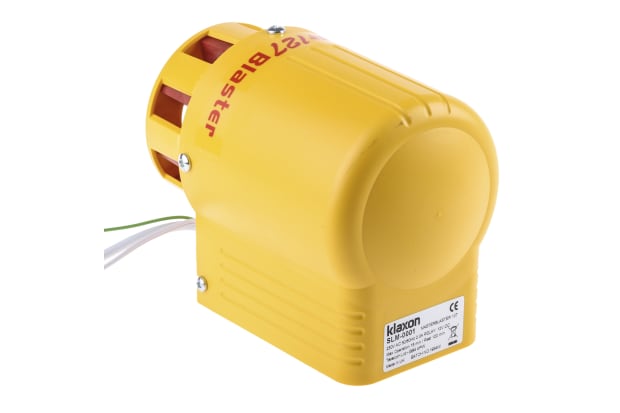- Published 29 Apr 2024
- Last Modified 29 Apr 2024
- 7 min
Understanding Electronic Sounders in Alarm Systems
Explore the role of electronic sounders in alarms. Learn how these devices work and why they are essential for safety and security

In New Zealand, the use of alarm systems is widespread in various settings, from industrial facilities to commercial buildings. These systems are designed to provide safety and security by alerting occupants to potential threats or emergencies. At the heart of these alarm systems are sounders, which play a critical role in delivering audible notifications when an alarm is triggered. In this article, we’ll explore what sounders are, how they work, and their importance in alarm systems across New Zealand.
What are Electronic Sounders?

Electronic sounders, also known as alarm sounders, are devices that are used to produce audible alerts in response to specific triggers or events. These sounders are an essential component of alarm systems and are designed to emit loud, attention-grabbing sounds that can be heard throughout a building or industrial facility.
Electronic sounders come in a variety of forms, including sirens, buzzers, and horns, each producing a distinct sound that can be easily recognised by those in the vicinity. In addition to their role in providing audible alerts, some electronic sounders are also equipped with visual indicators, such as flashing lights, to further enhance their effectiveness in drawing attention to an alarm condition.

The Role of Electronic Sounders in Industrial and Commercial Settings
Electronic sounders are a vital part of all commercial and industrial alarm systems. They are used in a wide range of environments, including commercial buildings and manufacturing facilities. The alarm sounder is the component that produces a noise when the alarm is triggered.
Some electronic sounders are specifically designed for demanding industrial settings, featuring high levels of durability and impact resistance. They are also highly visible for the workplace and loud enough to cut across the noise of machinery. For example, we have electronic sounders that deliver output of up to 116 decibels.
In industrial environments, electronic sounders are often used in conjunction with other alarm devices, such as beacons or signal towers, to create a multi-modal alarm system that can provide both audible and visual alerts. This combination of sound and light can be particularly effective in ensuring that alarms are noticed and responded to promptly, even in noisy or busy industrial settings.
How Do Electronic Sounders Work in Alarm Systems?
The operation of electronic sounders in an alarm system is relatively straightforward. When a sensor, such as a fire detector or intruder alarm, detects a potential threat or emergency, it sends a signal to the alarm control panel. The control panel then activates the electronic sounders, causing them to emit loud, attention-grabbing sounds that serve as a warning to building occupants.
The control panel can also be programmed to trigger specific sound patterns or sequences based on the type of emergency, allowing for different alarm tones to be used for fire, intrusion, or other types of incidents. This can help to provide additional information to those in the vicinity and aid in the appropriate response to the situation.
How to Choose the Right Electronic Sounder for Your Alarm System
When selecting electronic sounders for your alarm system, there are several factors to consider to ensure that they are well-suited to the specific needs and requirements of your environment.
One of the most important considerations is the sound output of the electronic sounder. Different environments may require different levels of volume to ensure that alarms are heard clearly. For example, in a noisy industrial setting, you may need electronic sounders with a higher decibel rating to cut through the ambient noise.
You’ll also want to consider the coverage area of the electronic sounder to ensure that it can provide adequate audibility throughout the space it is intended to cover. This may involve selecting sounders with different power ratings or strategically placing multiple sounders in key locations to ensure comprehensive coverage.
The durability of the electronic sounder is another important factor, particularly in industrial settings where the devices may be exposed to harsh conditions. Look for sounders that are designed to withstand environmental factors such as dust, moisture, or extreme temperatures to ensure reliable performance over time.
Finally, consider whether visual indicators, such as flashing lights, are needed in addition to the audible alerts provided by the electronic sounders. In some environments, a combination of sound and light may be more effective in ensuring that alarms are noticed and responded to promptly.
By taking these factors into account, you can choose electronic sounders that are well-suited to your specific environment and help to enhance the overall effectiveness of your alarm system.
Conclusion
Electronic sounders are a critical component of alarm systems in New Zealand, playing a key role in providing audible alerts in response to potential threats or emergencies. Whether in industrial, commercial, or other settings, these devices help to ensure the safety and security of building occupants by delivering timely and effective warnings.
By understanding how electronic sounders work and the factors to consider when choosing them, you can help to create alarm systems that are well-suited to the needs of your environment. Whether used on their own or in combination with other alarm devices, electronic sounders are an essential tool for maintaining a safe and secure space for all building occupants in New Zealand.
FAQ
Popular Brands
At RS, we have a range of components for every part of your commercial alarm system. Explore our complete collection of security alarms and sensors.
